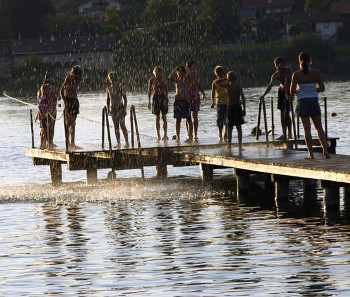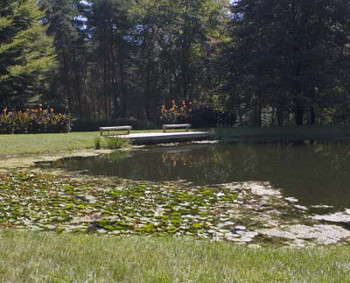When you pack safety items for a family trip to a Texas lake or river this season, you probably will bring
sunscreen, insect repellant and floatation devices. But did you remember the nose plugs?
You may not know it, in fact few people do, but nose clips could help prevent a rare but deadly disease
caused by a microorganism that can be found in untreated fresh water. With the weather really starting to heat
up, the Brazos River Authority encourages visitors to have fun, while being aware of health risks associated
with swimming in stagnant or slow-moving water.

Primary amebic meningoencephalitis
(PAM), is a rare disease caused by
naegleria fowleri, an amoeba found in
almost all untreated, fresh surface water
and in soil. The amoeba thrives in low
levels of fresh water that is warmer than
80 degrees and stagnant or slow moving.
The PAM infection occurs when water
containing the organism is forced into
the nasal passages – usually from
diving or jumping into water or from
water skiing. The amoeba makes its
way into the brain and spinal cord,
destroying brain tissue. Again, while the
disease is extremely uncommon,
identified cases thus far have almost
always been lethal.
According to state health officials there have been only 10 cases of PAM diagnosed in Texas since 2000,
including the death last year of an Arlington boy. In that case, 7-year-old Kyle Lewis died a few days after a
swimming trip with his family. Since this tragedy, Kyle’s family have taken up the call to urge parents to be
aware of the issue and to use protection such as nose clips when their children swim in fresh, untreated water.
To learn more about the family’s efforts, please click here.

There have been no known PAM cases in
Texas yet this year. Symptoms of the infection
include severe headache, high fever, stiff neck,
nausea, vomiting, seizures and hallucinations
as the condition worsens. Although PAM is rare,
those infected usually succumb to the disease
within a week.
To help reduce the already low chance of
infection, state health officials recommend that
those taking part in warm, fresh water-related
activities use nose clips or hold their noses shut
while jumping into water. With the amoeba
often found in soil, it is best to avoid stirring up
underwater sediment. Health officials
recommend people avoid stagnant or polluted
water and take “No Swimming” signs seriously.
PAM cannot be spread person to person nor by drinking water. Swimming pools and hot tubs that are properly
cleaned, maintained and chlorinated are generally safe, as is salt water.
For more information about PAM, please click here or contact the Texas Department of State Health Services
Public Information Office at (512) 458-7400.